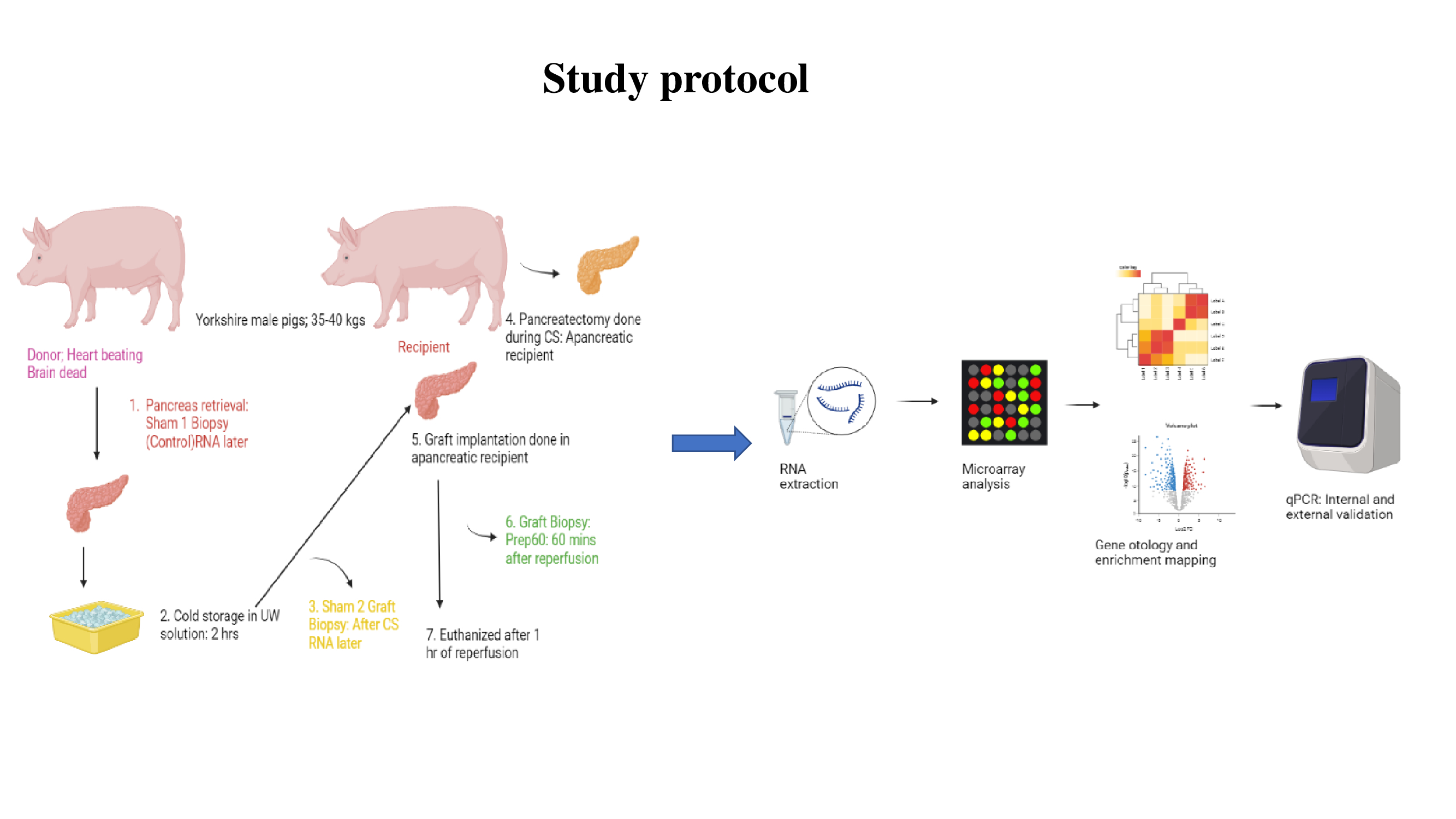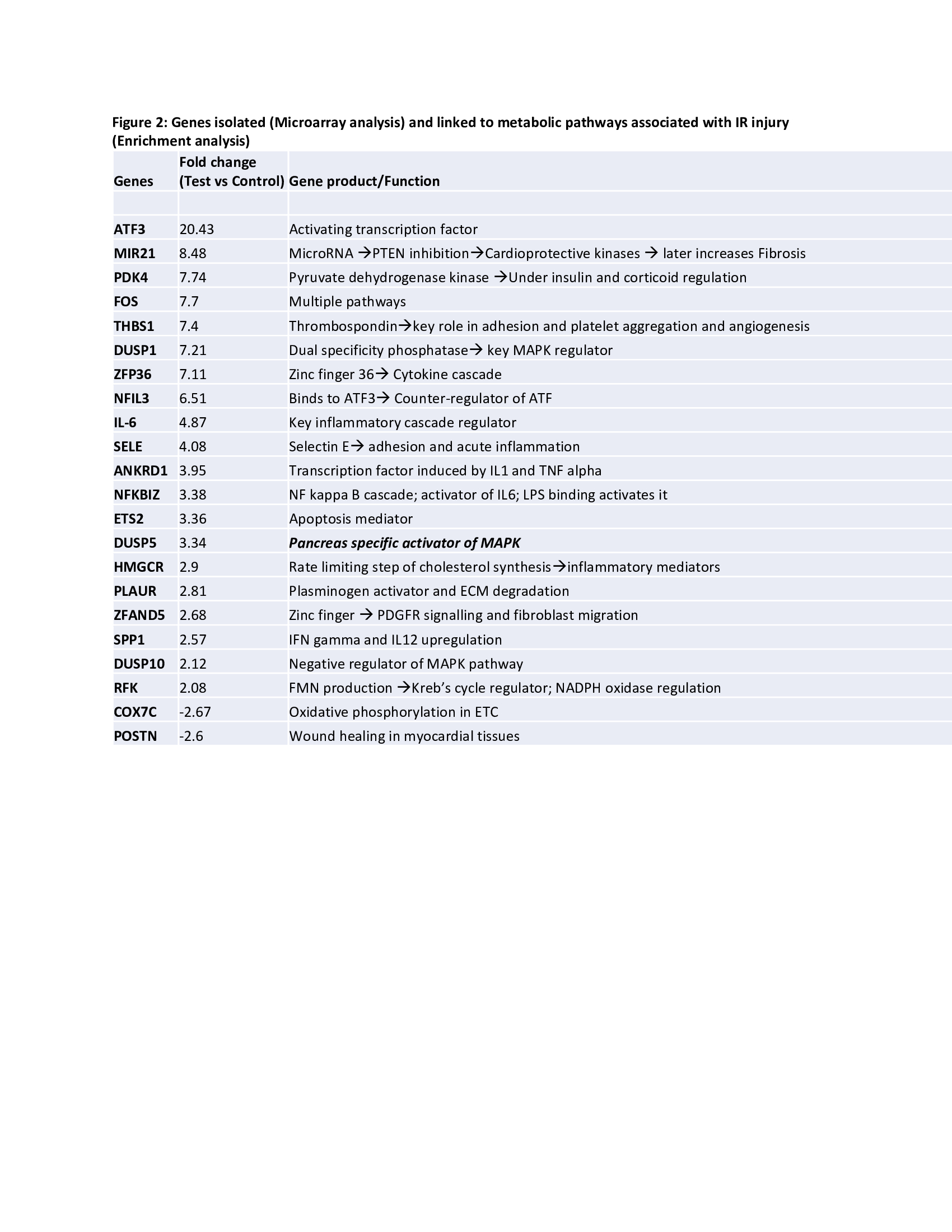Establishment of a genetic signature of ischemia reperfusion injury in a porcine pancreas transplantation model
Samrat Ray1,2, Catherine Parmentier1,2, Masataka Kawamura1,2, Christian Hobeika1,2, Emmanuel Nogueira1,2, Francisco Calderon Novoa1,2, Tun Pang Chu1,2, Sujani Ganesh1,2, Chao Lu3, Markus Selzner1,2, Trevor Reichman1,2.
1Ajmera Transplant Centre, Toronto general hospital, Toronto, ON, Canada; 2Toronto organ preservation laboratory, Toronto general hospital, Toronto, ON, Canada; 3The Centre for Applied Genomics, Sick Kids Hospital, Toronto, ON, Canada
Toronto organ preservation laboratory.
Introduction: Despite considerable advancement in surgical and immunological management in pancreas transplantation, graft pancreatitis remains a feared complication, occurring in 17-30% of cases after pancreas transplantation. Identification of molecular mechanisms of underlying ischemia reperfusion (IR) injury in pancreas transplantation could therefore pave the path for targeted therapy to improve surgical outcomes. The aim of the study was to identify the genes differentially expressed in the early period of graft reperfusion in porcine pancreas transplantation models.
Methods: A porcine pancreas transplant model was used as outlined in Figure 1. Graft pancreatectomy in the donor and implantation in a recipient pig after 2hr cold storage. The native recipient pancreas was removed. The graft tissues were isolated from each experiment, in-vivo (Control 1), after 2 hours of cold storage (Control 2) and 60 mins after reperfusion (Test) and stored in (Ribonucleic acid) RNA later solution; RNA isolated using the Qiagen RNA lipid Mini easy kit, subjected to bio-analyser (Agilent Tech) and selected for microarray analysis using Porcine Gene1.0ST (Affymetrix). The gene sets were analysed using the Transcriptome analysis console (TAC, ThermoFisher ver 4.0.3.14) and g:Profiler and Cytoscape (ver 3.9.1), for gene otology (GO) and enrichment analysis respectively.

Results: Four porcine pancreas transplants were performed. A total of 20 genes were found consistently upregulated and 2 downregulated in the test samples compared to the controls. The genes were mapped to the Mitogen activated protein (MAP) kinase signalling pathways (ATF3, THBS1, DUSP 1,5, 10), apoptotic signalling cascade (IL6, ZFP36, ANKRD1), Kreb’s cycle and oxidative phosphorylation (RFK, HMGCR) and intercellular adhesion and leucocyte activation (SELE, FOS), pathways mostly linked to IR injury (See Figure 2 for details). MIR21 gene, linked to micro-RNA pathway of IR injury (Myocardial ischemia model) was found significantly upregulated in the reperfusion tissues (Fold change 8.48; p<0.05, q <0.05). Messenger RNAs of COX7C (associated with oxidative phosphorylation) and POSTN (wound healing in myocardial ischemia models) were found consistently downregulated in the post-reperfusion and cold stored tissues respectively.

Conclusion: The results provide new insights into molecular and biochemical pathways linked to pancreatic IR injury in experimental pancreas transplantation model. Targeting potential genes like HMGCR (linked to cholesterol biosynthesis and downstream isoprenylation pathway of inflammation) and IL6 (Apoptotic signalling cascade) could be promising in alleviating the tissue injury associated with IR and resultant graft pancreatitis after transplantation and offer potential targets for preconditioning grafts using normothermic machine perfusion.
Lan He and Xiaolin Wang (The centre for applied genomics, Sick Kids, Toronto).
References:
[1] 1. Drognitz O, Michel P, Koczan D, Neeff H, Mikami Y, Obermaier R, Thiesen HJ, Hopt UT, Loebler M. Characterization of ischemia/reperfusion-induced gene expression in experimental pancreas transplantation. Transplantation. 2006 May 27;81(10):1428-34. doi: 10.1097/01.tp.0000208619.71264.40.
2. Urbanellis P, McEvoy CM, Škrtić M, Kaths JM, Kollmann D, Linares I, Ganesh S, Oquendo F, Sharma M, Mazilescu L, Goto T, Noguchi Y, John R, Mucsi I, Ghanekar A, Bagli D, Konvalinka A, Selzner M, Robinson LA. Transcriptome Analysis of Kidney Grafts Subjected to Normothermic Ex Vivo Perfusion Demonstrates an Enrichment of Mitochondrial Metabolism Genes. Transplant Direct. 2021 Jul 8;7(8):e719. doi: 10.1097/TXD.0000000000001157. PMID: 34258386
Lectures by Samrat Ray
| When | Session | Talk Title | Room |
|---|---|---|---|
|
Sat-28 10:00 - 11:30 |
Pancreas Transplantation: Assessing outcomes and long-term results | Establishment of a genetic signature of ischemia reperfusion injury in a porcine pancreas transplantation model | Indigo H |
